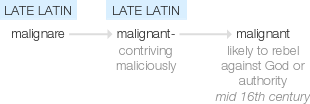Malignant
mid 16th century (also in the sense ‘likely to rebel against God or authority’): from late Latin malignant- ‘contriving maliciously’, from the verb malignare . The term was used in its early sense to describe Royalist sympathizers during the English Civil War.
wiktionary
From Middle French malignant, from Late Latin malignans. See malign.
etymonline
malignant (adj.)
1560s, in reference to diseases, "virulent, tending to produce death," from French malignant and directly from Late Latin malignantem (nominative malignans) "acting from malice," present participle of malignare "injure maliciously," from Latin malignus "wicked, bad-natured," from male "badly" (see mal-) + -gnus "born," from gignere "to bear, beget" (from PIE root *gene- "give birth, beget").
Earlier in the church malignant "followers of the antichrist," from Latin ecclesiam malignantum in early Church writing, applied by Protestant writers to the Church in Rome (1540s). Of persons, "disposed to inflict suffering or cause distress," from 1590s. As an adjective, Middle English used simple malign (early 14c.), also malignous "poisonous, noxious." Related: Malignantly.
